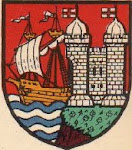To the south of Frundsberg lies the Duchy of Pommaine. Research in the archives reveal limited evidence of the thankfully short war between the Frei Stadt and the Duke. The origins of the war lay in the development of new fermentation techniques across Europe, which resulted in the Duchy laying claim to be the sole German producer of sparking apfelwein.. This claim being supported by French subsidies used by the Duke to increase the size of Pommaine's army.
Pommaine issued an ultimatum to Frundsberg to cease sparkling cider production or its forces would enforce "its legal" rights". Meanwhile the Frei Stadt forewarned by its spies (always a useful fringe benefit of being a trading state) had hired additional units from Hesse and other neighbouring states to strengthen its army.
The Pommiane strategy was for an advance by three columns through lower Frundsberg with the objective of destroying all the orchards.
Frundsberg, however opted for a dramatic and risky strategy of placing the majority of the army to the east and fighting a delaying action in the west and centre while the main army swept in from the east and destroyed each Pommaine column in turn. This strategy was based on lower Frundsberg being a fertile drained area leading west to the Rhine and the higher ground was to the east. All that was needed was for the bridges over the drainage canals to be destroyed in sufficient time before the Pommaine forces could capture them.
The Frundsberg plan work better than they hoped, the destruction of bridges would disrupt trade so these actions were delayed as long as possible. The defending Frundsberg forces, mostly light cavalry and some infantry acting as pioneers, were coordinated by a signalling systems set up centred on the Glasserberg, a high hill overlooking the levels. Throughout the whole period, visibility remained good allowing the Frundsberg forces to destroy almost every bridge before the Pommainers reached them.
One day after the Pommaine offensive had started a signal was given for the main Frundsberg army to attack. Their assault hit the right flank of the eastern Pommaine column with overwhelming strength and shattered it beyond recovery. At this point, rather than continuing to attack the two remaining columns, the army struck deep behind the Pommaine front at their second city of Bruckewasser. Although this attack crossed similar terrain to that in lower Frundsberg the bridges were generally undefended and captured by advance parties of dragoons. The Frunsberg army arrived in front of Bruckewasser as summoned it to surrender rather than suffer sack an pillage. There was no hope for the small Bruckewasser garrison as the remaining Pommaine forces were several days march away.
The Duke of Pommaine arrived with some intermediaries from other neighbouring states and agreed to renounce his claims and pay substantial reparations. As always, the Frei Stadt managed to turn a profit from war, even if, as in this case, they were directly involved.
Note, the actions were actually fought as a solo campaign and no actual battles were fought with figures. The Frundsberg forces were weaker but of better quality, the Pommaine army was still overall superior, but I may have been biased somewhat when playing!
Friday 7 September 2007
Subscribe to:
Post Comments (Atom)

3 comments:
Who cares if you were biased? It makes for a good tale in any event.
One of the wonderful things about fictional nations is that no-one really gets shot -- just imaginary soldiers (after all, even the lead or plastic figures survive to fight another day).
Keep up the good posts!
-- Jeff
Glad to read anew about the Frundsberg Frei Stadt, its army and the battle honors of its forces!
Keep posting for our enjoyment!
Jean-Louis
Could you tell us more about the army of Pommaine, its uniforms, &c..?
Of course, as the battle was a solo game, you could well have used any minis.
Regards,
Jean-Louis
Post a Comment